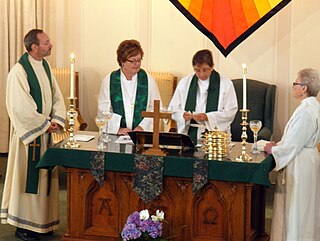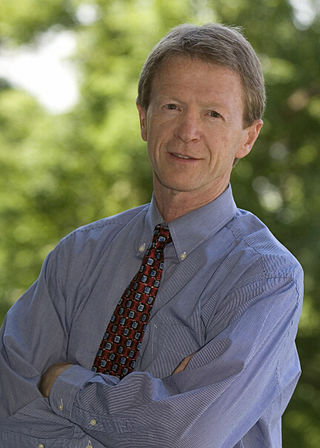Within Christianity, there are a variety of views on sexual orientation and homosexuality. The view that various Bible passages speak of homosexuality as immoral or sinful emerged in the first millennium AD, and have since become entrenched in many Christian denominations through church doctrine and the wording of various translations of the Bible.

Alan Bray was a British historian and gay rights activist. He was a Roman Catholic and had a particular interest in Christianity's relationship to homosexuality.

Homoeroticism is sexual attraction between members of the same sex, either male–male or female–female. The concept differs from the concept of homosexuality: it refers specifically to the desire itself, which can be temporary, whereas "homosexuality" implies a more permanent state of identity or sexual orientation. It has been depicted or manifested throughout the history of the visual arts and literature and can also be found in performative forms; from theatre to the theatricality of uniformed movements. According to the Oxford English Dictionary, it is "pertaining to or characterized by a tendency for erotic emotions to be centered on a person of the same sex; or pertaining to a homo-erotic person."
There are a number of passages in the Hebrew Bible and the New Testament that have been interpreted as involving same-sex sexual activity and relationships. The passages about homosexual individuals and sexual relations in the Hebrew Bible are found primarily in the Torah. The book of Leviticus chapter 20 is more comprehensive on matters of detestable sexual acts. Some texts included in the New Testament also reference homosexual individuals and sexual relations, such as the Gospel of Matthew, the Gospel of Luke, and various letters attributed to the Apostle Paul originally directed to the early Christian churches in Asia Minor. Both references in the Hebrew Bible and the New Testament have been interpreted as referring primarily to male homosexual individuals and sexual practices.

Nancy L. Wilson is an American cleric who served as the moderator of the Universal Fellowship of Metropolitan Community Churches. Under Wilson's leadership, the denomination became known as "The Human Rights Church" in many parts of the world for its commitment to same-sex marriage, employment and housing non-discrimination laws.
Queer theology is a theological method that has developed out of the philosophical approach of queer theory, built upon scholars such as Marcella Althaus-Reid, Michel Foucault, Gayle Rubin, Eve Kosofsky Sedgwick, and Judith Butler. Queer theology begins with the assumption that gender variance and queer desire have always been present in human history, including faith traditions and their sacred texts such as the Jewish Scriptures and the Bible. It was at one time separated into two separate theologies; gay theology and lesbian theology. Later, the two would merge and expand to become the more inclusive term of queer theology.
Revd ProfessorElizabeth Stuart is a British theologian specialising in Queer Theology.

John J. McNeill was an American Catholic priest, psychotherapist and academic theologian in the United States, with a particular reputation within the field of queer theology. McNeill was awarded the National Human Rights Award in 1984 for his contributions to lesbian and gay rights, and was made the Grand Marshal of the New York City Gay Rights Parade in 1987. McNeill was expelled from the Society of Jesus in 1987 at the request of the Vatican, but continued to serve as a Catholic priest in New York City until his death on September 22, 2015.
The traditional understanding of Christian churches and theologians is that Jesus did not marry and remained celibate until his death. That has not prevented speculation about alternative and fringe theories of his sexuality. The Gospels and the New Testament reveal little on the subject.

Jean-Guenolé-Marie Daniélou was a French Jesuit and cardinal, an internationally well known patrologist, theologian and historian and a member of the Académie Française.
Ralph Blair is an American psychotherapist and founder of The Homosexual Community Counseling Center in New York City. In 1975, he founded Evangelicals Concerned, Inc., a U.S.-wide network of gay and lesbian evangelical Christians and friends.

Philip Layton Barlow is a Harvard-trained scholar who specializes in American religious history, religious geography, and Mormonism. In 2019, Barlow was appointed associate director of the Neal A. Maxwell Institute for Religious Scholarship. Barlow was the first full-time professor of Mormon studies at a secular university as the inaugural Leonard J. Arrington Chair of Mormon History and Culture at Utah State University (USU), from 2007 to 2018.
Theodore Wesley Jennings Jr., also known as Ted Jennings, was an American theologian and Methodist minister. He was Professor of Biblical and Constructive Theology at the United Church of Christ's Chicago Theological Seminary, where he had previously served as Acting Academic Dean. Jennings gained a notoriety for his work on ritual studies, the Messianic politics of Pauline discourse, and theological engagement with the work of Dietrich Bonhoeffer and Jacques Derrida.
Isabel Carter Heyward is an American feminist theologian and priest in the Episcopal Church, the province of the worldwide Anglican Communion in the United States. In 1974, she was one of the Philadelphia Eleven, eleven women whose ordinations eventually paved the way for the recognition of women as priests in the Episcopal Church in 1976.
Many views are held or have been expressed by religious organizations in relation to same-sex marriage. Arguments both in favor of and in opposition to same-sex marriage are often made on religious grounds and/or formulated in terms of religious doctrine. Although many of the world's religions are opposed to same-sex marriage, the number of religious denominations that are conducting same-sex marriages have been increasing since 2010. Religious views on same-sex marriage are closely related to religious views on homosexuality.
Christian denominations have a variety of beliefs about sexual orientation, including beliefs about same-sex sexual practices and asexuality. Denominations differ in the way they treat lesbian, bisexual, and gay people; variously, such people may be barred from membership, accepted as laity, or ordained as clergy, depending on the denomination. As asexuality is relatively new to public discourse, few Christian denominations discuss it. Asexuality may be considered the lack of a sexual orientation, or one of the four variations thereof, alongside heterosexuality, homosexuality, bisexuality, and pansexuality.

LGBT history in the United States spans the contributions and struggles of lesbian, gay, bisexual, and transgender (LGBT) people, as well as the LGBT social movements they have built.
Christian agnosticism is a theological position drawing influences from Christianity as well as agnosticism. Christian agnostics hold that it is difficult or impossible to be sure of anything beyond the basic tenets of the Christian faith. They believe that God or a higher power might exist, that Jesus may have a special relationship with God, might in some way be divine, and that God might perhaps be worshipped. This belief system has deep roots in the early days of the Church.

The following outline offers an overview and guide to LGBT topics.






